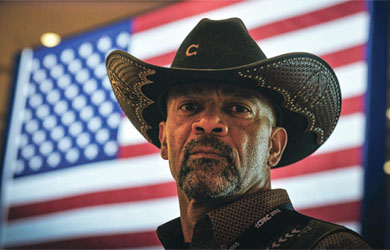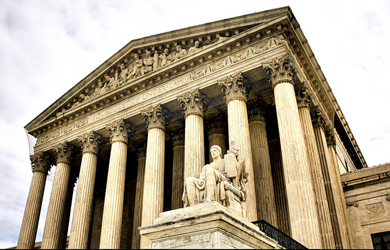Here is something that you don’t see every day: a group of leading conservatives calling for legal reform because we are locking too many people up in prison:
A group of national conservatives led by Grover Norquist of Americans for Tax Reform, Russell Keene of the American Conservative Union, and former Attorney General Ed Meese unveiled the“Right On Crime” initiative and website. The group held a conference call this morning to unveil the website.
Texas Public Policy Foundation President Brooke L. Rollins told reporters that Texas saved billions while its crime rate declined 9 percent. Rollins said the project will help cash-strapped state save money while continuing to crack down on violent crime.
Levin added that the Texas crime rate is the lowest since 1993. He also noted that probationers pay dramatically more in restitution to victims than prisoners.Norquist noted that criminal justice is a legitimate function of government but that conservatives ought to be interested in saving money and performing that function as efficiently as possible. He added that much of the conservative interest in rehabilitation and prison reform started with faith-based organizations.
Chuck Colson with Prison Fellowship Industries and Pat Nolan with the Justice Fellowship are among the supporters of the Right On Crime Initiatives. “As many lives as we could turn around, the system was eating up even more,” said Nolan, explaining why his group has been active in working toward avoiding hyper-technical application of parole violation laws. Nolan emphasized that it’s important to hold the criminal justice system accountable for results, including changed lives. Nolan added that having tough-on-crime conservatives like Meese associated with this effort provides both sides cover to do what they know is right without having to worry about being portrayed as soft-on-crime.
Of course, they aren’t doing this because they are a bunch of bleeding-heart liberals, but rather because it is a way to controlling government spending and make the justice system more cost-effective:
Conservatives are known for being tough on crime, but we must also be tough on criminal justice spending. That means demanding more cost-effective approaches that enhance public safety. A clear example is our reliance on prisons, which serve a critical role by incapacitating dangerous offenders and career criminals but are not the solution for every type of offender. And in some instances, they have the unintended consequence of hardening nonviolent, low-risk offenders—making them a greater risk to the public than when they entered.
Applying the following conservative principles to criminal justice policy is vital to achieving a cost-effective system that protects citizens, restores victims, and reforms wrongdoers.
1. As with any government program, the criminal justice system must be transparent and include performance measures that hold it accountable for its results in protecting the public, lowering crime rates, reducing re-offending, collecting victim restitution and conserving taxpayers’ money.
2. Crime victims, along with the public and taxpayers, are among the key “consumers” of the criminal justice system; the victim’s conception of justice, public safety, and the offender’s risk for future criminal conduct should be prioritized when determining an appropriate punishment.
3. The corrections system should emphasize public safety, personal responsibility, work, restitution, community service, and treatment—both in probation and parole, which supervise most offenders, and in prisons.
4. An ideal criminal justice system works to reform amenable offenders who will return to society through harnessing the power of families, charities, faith-based groups, and communities.
5. Because incentives affect human behavior, policies for both offenders and the corrections system must align incentives with our goals of public safety, victim restitution and satisfaction, and cost-effectiveness, thereby moving from a system that grows when it fails to one that rewards results.
6. Criminal law should be reserved for conduct that is either blameworthy or threatens public safety, not wielded to grow government and undermine economic freedom.
These principles are grounded in time-tested conservative truths—constitutionally limited government, transparency, individual liberty, personal responsibility, free enterprise, and the centrality of the family and community. All of these are critical to addressing today’s criminal justice challenges. It is time to apply these principles to the task of delivering a better return on taxpayers’ investments in public safety. Our security, prosperity, and freedom depend on it.
Signatories include Newt Gingrich, Grover Norquist, Edwin Meese, William J. Bennett, Asa Hutchinson, David Keene, Richard Viguerie, Chuck Colson, Tony Perkins, Rabbi Daniel Lapin, Penny Nance, Ward Connerly, and Viet Dinh.








